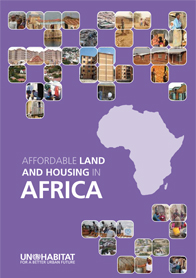Location
UN-Habitat is the United Nations programme working towards a better urban future.
Its mission is to promote socially and environmentally sustainable human settlements development and the achievement of adequate shelter for all. Cities are facing unprecedented demographic, environmental, economic, social and spatial challenges. There has been a phenomenal shift towards urbanization, with 6 out of every 10 people in the world expected to reside in urban areas by 2030. Over 90 per cent of this growth will take place in Africa, Asia, Latin America, and the Caribbean. In the absence of effective urban planning, the consequences of this rapid urbanization will be dramatic. In many places around the world, the effects can already be felt: lack of proper housing and growth of slums, inadequate and out-dated infrastructure – be it roads, public transport, water, sanitation, or electricity – escalating poverty and unemployment, safety and crime problems, pollution and health issues, as well as poorly managed natural or man-made disasters and other catastrophes due to the effects of climate change. Mindsets, policies, and approaches towards urbanization need to change in order for the growth of cities and urban areas to be turned into opportunities that will leave nobody behind. UN-Habitat, the United Nations programme for human settlements, is at the helm of that change, assuming a natural leadership and catalytic role in urban matters. Mandated by the UN General Assembly in 1978 to address the issues of urban growth, it is a knowledgeable institution on urban development processes, and understands the aspirations of cities and their residents. For close to forty years, UN-Habitat has been working in human settlements throughout the world, focusing on building a brighter future for villages, towns, and cities of all sizes. Because of these four decades of extensive experience, from the highest levels of policy to a range of specific technical issues, UN-Habitat has gained a unique and a universally acknowledged expertise in all things urban. This has placed UN-Habitat in the best position to provide answers and achievable solutions to the current challenges faced by our cities. UN-Habitat is capitalizing on its experience and position to work with partners in order to formulate the urban vision of tomorrow. It works to ensure that cities become inclusive and affordable drivers of economic growth and social development.
Members:
Resources
Displaying 146 - 150 of 224Managing urban land: a guide for municipal practitioners
Urban land markets have a profound effect on how well poor households are able to access the jobs, amenities and services offered in the city. But often the way in which this market works frustrate attempts to open up better located living and business opportunities for poorer urban households and communities, despite government policies and programmes intended to address these challenges. The challenge in South Africa is even larger because of worsening poverty and inequality, and the continuing growth of cities through urbanisation.
Metropolitan Governance: A Framework for Capacity Assessment. Guidance Notes and Toolbox
UN-Habitat and GIZ have developed the Metropolitan Capacity Assessment Methodology (MetroCAM) as a joint contribution to implement urban sustainable development agendas and bring them to the metropolitan scale. It complements the Unpacking Metropolitan Governance series.
Affordable Land and Housing in Africa
In the vast majority of countries land and housing affordability is a critical contemporary challenge. While in different countries and regions the specificities of the challenge vary, the universal truism is that it is becoming increasing difficult for the vast majority of urban residents to obtain and retain adequate and affordable land and housing.
“Securing Women’s Land Rights in Southern and Eastern Africa”- Report on a CPA-UK Lecture
This report covers the lunchtime lecture on “Securing Women’s Land Rights in Southern and Eastern Africa” organised by the Commonwealth Parliamentary Association that took place at the Houses of Parliament on Wednesday 8th February at 12.30, with the participation of Mokoro’s Elizabeth Daley. Also speaking were Simon Levine of ODI and Ruchi Tripathi of ActionAid International, with Heidi Alexander MP in the Chair.
The state of Arab cities 2012: challenges of urban transition
This regional report by the United Nations Human Settlements Programme (UN-HABITAT) highlights that, although urban slums are decreasing and urban innovations are being introduced, the Arab region still faces major challenges, including high youth unemployment rates and climate change. The report argues that climate change can increase competition over scarce resources, decrease food security, increase poverty and social instability, and accelerate environmental migration and militarisation over natural resources in the area.





